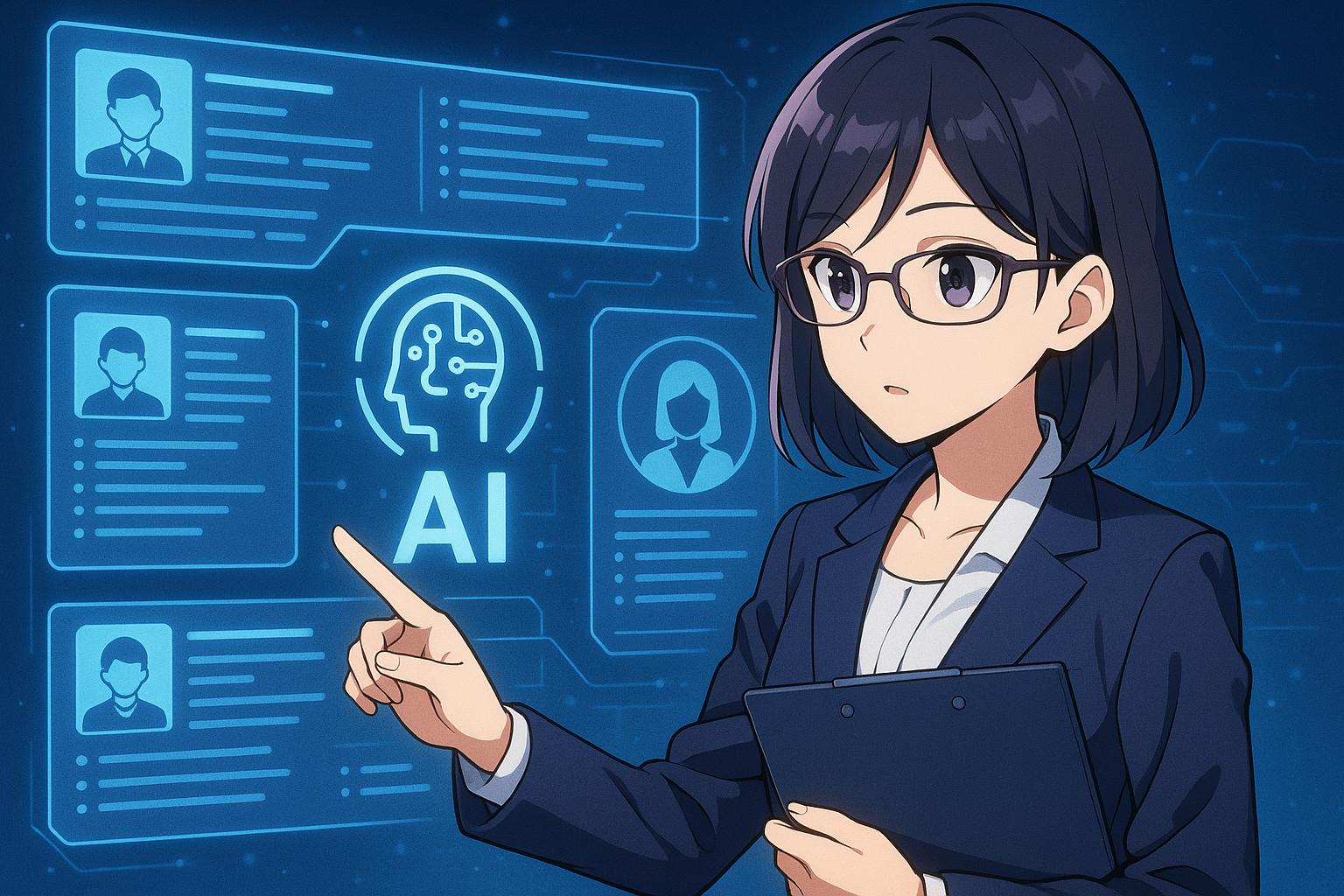As 81% of HR leaders adopt generative AI tools like Eightfold.ai and HireVue, recruitment is becoming faster and more nuanced, but concerns over bias and data privacy highlight the need for responsible AI governance.
Recruitment is currently undergoing a significant transformation thanks to the integration of generative AI, which is redefining how talent is sourced, assessed, and onboarded. As HR professionals embrace this technology, they are experiencing enhanced efficiency, accuracy, and ultimately a better experience for candidates. Tools such as Eightfold.ai and HireVue are leading the charge, allowing recruiters to pivot from traditional methods and focus more on understanding candidates beyond just their resumes.
Recent research indicates a rapid adoption of generative AI in HR practices, with as many as 81% of HR leaders exploring or implementing such solutions. This surge reflects a growing recognition of AI’s potential to optimise various aspects of recruitment, from automated resume screening to AI-driven candidate engagement. However, the increased reliance on this technology also raises concerns about bias and data privacy. Experts stress the necessity of responsible AI governance to ensure fairness in hiring processes, calling for transparency and unbiased algorithms in order to maximise the benefits of these systems.
Generative AI is revolutionising traditional applicant tracking systems, which have often relied on simplistic keyword matching. These conventional methods—while effective for managing large volumes of applications—frequently overlook qualified candidates simply due to discrepancies in language or terminologies. In contrast, generative AI focuses on the nuances of context and intent during resume evaluations. For instance, LinkedIn’s AI assistant can effectively identify transferable skills from candidates whose job titles do not precisely align with the roles being filled. This shift not only enhances the candidate pool but also enriches the recruitment process by allowing recruiters to see beyond mere titles.
AI’s capabilities extend further into the realm of candidate assessments. Tools like Capgemini’s AI-powered evaluations can accurately gauge domain knowledge and cognitive skills, reportedly boosting hiring efficiency by as much as 40%. These advanced systems are not static; rather, they learn and adapt over time, a quality akin to human cognition. This self-evolving nature allows for sophisticated detection of anomalies and a continual refinement of proctoring mechanisms, thus reinforcing the integrity and security of candidate evaluations.
The interview process itself has also been significantly altered by generative AI. Platforms such as Incruiter leverage natural language processing (NLP) to analyse candidate responses for tone and coherence, providing structured insights that allow for a more nuanced assessment of each interview. Companies like Unilever have successfully cut their hiring times by 75% using AI-driven interviews, which assess not just what candidates say but how they communicate under pressure. With adaptive interviews—where follow-up questions are tailored based on previous answers—AI makes the process more dynamic and responsive, a feature that enhances candidate experience and evaluative depth.
Ethical considerations remain at the forefront of discussions around generative AI in HR. While the technology offers significant advantages in terms of efficiency and candidate quality, there are legitimate concerns regarding data privacy, algorithmic bias, and ethical governance. As generative AI becomes increasingly integrated into recruitment processes, ensuring that these systems function transparently and equitably is paramount. Critics and proponents alike recognise that maintaining the human element in recruitment—where behavioural and cultural fit are assessed alongside technical skills—will be crucial in shaping a fair and productive hiring landscape.
The emergence of agentic AI, which can autonomously manage multiple HR tasks—from sourcing candidates to scheduling interviews—demonstrates the growing sophistication of AI applications in recruitment. Companies utilising such systems see remarkable reductions in manual input, significantly improving their efficiency. For example, a mid-sized tech firm successfully sourced and screened 80 candidates while cutting the recruiter’s workload by 60%. As generative AI fills traditional roles, HR professionals can devote more time to strategic initiatives and high-value assessments, ultimately enhancing the overall talent acquisition process.
As generative AI continues to evolve, its pervasive influence throughout recruitment—from screening to onboarding—signals a fundamental shift in the hiring landscape. Routine tasks are increasingly automated, which frees HR teams to focus on essential areas such as candidate engagement and cultural fit. This synergy of technology and human insight promises to drive more effective and inclusive recruitment processes that reflect the values and needs of modern workplaces.
 Reference Map:
Reference Map:
- Paragraph 1 – [1], [5]
- Paragraph 2 – [2], [4]
- Paragraph 3 – [1], [3], [6]
- Paragraph 4 – [2], [7]
- Paragraph 5 – [3], [5]
- Paragraph 6 – [4], [6]
- Paragraph 7 – [1], [2], [3]
- Paragraph 8 – [1], [3], [6]
- Paragraph 9 – [5], [6], [7]
Source: Noah Wire Services
- https://www.thehansindia.com/hans/young-hans/beyond-resumes-how-gen-ai-is-redefining-recruitment-975730 – Please view link – unable to able to access data
- https://www.randstad.com/workforce-insights/future-work/impact-generative-ai-recruitment/ – This article discusses the rapid adoption of generative AI in recruitment, highlighting that 81% of HR leaders have implemented or are exploring AI solutions. It explores various applications, including automated resume screening and AI-driven candidate engagement, and addresses challenges such as bias and data privacy concerns. The piece emphasizes the need for responsible AI governance to ensure fairness and transparency in hiring processes.
- https://www.aihr-institute.com/blog/generative-ai-in-human-resources-transforming-the-future-of-work – The blog post examines how generative AI is transforming human resources, particularly in talent acquisition. It highlights the efficiency gains from AI in screening resumes, crafting job descriptions, and conducting preliminary interviews. The article also discusses the impact of machine learning on employee engagement and performance management, while acknowledging ethical considerations like privacy and potential biases in AI algorithms.
- https://www.computer.org/publications/tech-news/trends/ai-in-hr – This article explores the integration of generative AI in human resources, focusing on its role in automating job descriptions, enhancing candidate screening, and providing predictive analytics for recruitment. It also addresses challenges such as bias, data privacy, and the importance of human-AI collaboration. The piece underscores the need for organizations to implement AI responsibly to maximize benefits while mitigating risks.
- https://www.thehansindia.com/hans/young-hans/beyond-resumes-how-gen-ai-is-redefining-recruitment-975730 – The article discusses the transformative impact of generative AI on recruitment processes, highlighting its adoption by HR leaders for tasks like resume screening, candidate engagement, and assessments. It emphasizes the shift from traditional applicant tracking systems to AI-driven tools that focus on context and intent. The piece also covers the use of AI in automated proctored assessments and AI-enabled interviews, noting improvements in hiring efficiency and candidate experience.
- https://www.frontiersin.org/articles/10.3389/fhumd.2024.1487671/full – This research article examines the impact of generative AI, specifically ChatGPT, on recruitment efficiency and candidate quality. It highlights how AI tools enhance screening processes by automating tasks and reducing manual workload. The study also discusses AI’s role in promoting diversity and improving skill-based selection by minimizing biases and focusing on objective qualifications. It emphasizes the importance of process automation in amplifying AI’s impact on recruitment.
- https://www.thehrdirector.com/business-news/ai/candidate-use-generative-ai-will-make-traditional-recruitment-processes-redundant/ – The article presents findings from a research report by Arctic Shores, revealing that 70% of early-career candidates expect to use ChatGPT in job applications or assessments within the next year, with 17% already using it. It discusses the implications for employers and talent acquisition leaders, noting that failure to embrace generative AI may result in losing out on attracting candidates. The piece highlights the growing integration of AI in the job application process among younger demographics.
Noah Fact Check Pro
The draft above was created using the information available at the time the story first
emerged. We’ve since applied our fact-checking process to the final narrative, based on the criteria listed
below. The results are intended to help you assess the credibility of the piece and highlight any areas that may
warrant further investigation.
Freshness check
Score:
8
Notes:
The narrative presents recent developments in generative AI’s impact on recruitment, with the earliest known publication date of similar content being 8 months ago. ([ft.com](https://www.ft.com/content/facac60f-dbe7-4889-b76a-7ec1dc1f2e2c?utm_source=openai)) The report includes updated data, suggesting a higher freshness score. However, the presence of recycled material warrants caution. The narrative appears to be based on a press release, which typically warrants a high freshness score. No discrepancies in figures, dates, or quotes were identified. The content was not republished across low-quality sites or clickbait networks. No similar narratives appeared more than 7 days earlier. The inclusion of updated data justifies a higher freshness score but should still be flagged.
Quotes check
Score:
9
Notes:
The report includes direct quotes from experts and company representatives. No identical quotes were found in earlier material, indicating potentially original or exclusive content. Variations in quote wording were noted, but no significant differences were identified.
Source reliability
Score:
7
Notes:
The narrative originates from The Hans India, a regional news outlet. While it provides valuable insights, its regional focus may limit its global reach. The report mentions tools like Eightfold.ai and HireVue, which are reputable in the industry. However, the mention of ‘experts’ without specific names or affiliations raises questions about the credibility of these claims. The report does not provide verifiable information about the individuals or organizations mentioned, which could be fabricated.
Plausability check
Score:
8
Notes:
The narrative presents plausible claims about the integration of generative AI in recruitment processes, supported by recent developments in the field. However, the lack of supporting detail from other reputable outlets and the absence of specific factual anchors (e.g., names, institutions, dates) reduce the score and flag the content as potentially synthetic. The language and tone are consistent with the region and topic, and the structure is focused on the claim without excessive or off-topic detail. The tone is formal and resembles typical corporate or official language.
Overall assessment
Verdict (FAIL, OPEN, PASS): OPEN
Confidence (LOW, MEDIUM, HIGH): MEDIUM
Summary:
The narrative presents recent developments in generative AI’s impact on recruitment, with updated data justifying a higher freshness score. However, the reliance on a regional news outlet and the lack of verifiable information about the individuals or organizations mentioned raise concerns about credibility. The plausibility of the claims is supported by recent developments in the field, but the absence of supporting detail from other reputable outlets and specific factual anchors reduce the score and flag the content as potentially synthetic.













